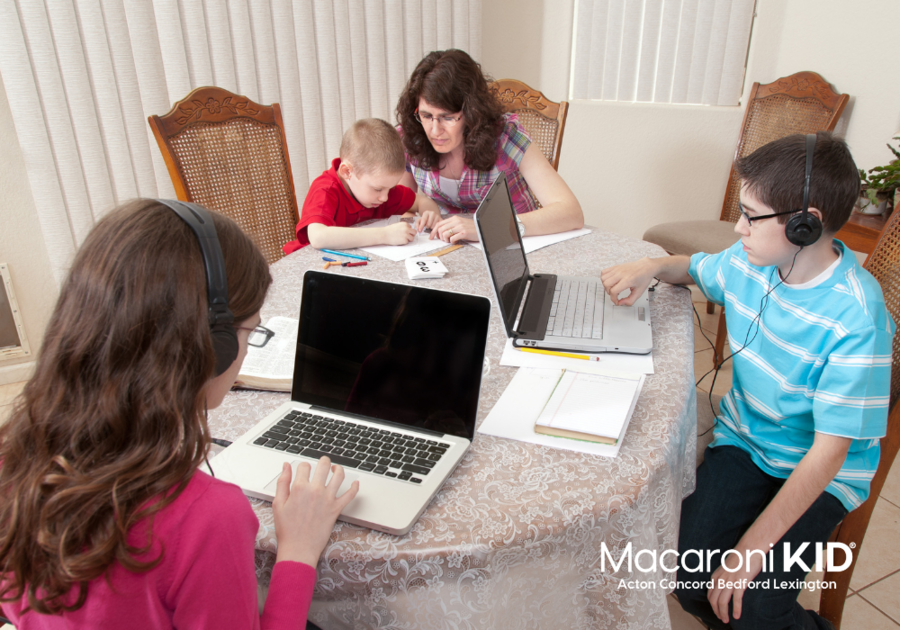When the world turned upside down in 2020 with COVID-19 closures and phased reopening in Massachusetts, many families began wondering what their options are for their school-aged children.. One option that some families began considering was homeschooling.
About Homeschooling
Homeschooling is a home-based method of education. As a homeschool parent, you are responsible for overseeing your child’s education instead of entrusting the school to manage that education. Homeschoolers decide how they want their children to learn, which materials they will use, and how they will teach. They can decide to teach everything themselves or to use outside classes or tutors for some subjects or topics of interest. Homeschooling isn’t about recreating public school at home; it’s about finding your own path.
Homeschooling shouldn’t be confused with the remote learning provided by public schools during the pandemic. Similarly, Massachusetts' two online public schools, Greenfield Commonwealth Virtual School and TECCA Connections Academy Commonwealth Virtual School, are not considered homeschooling.
Why Homeschool?
Families homeschool for a wide range of reasons. Many choose to homeschool so they can provide a different type of educational experience than is offered in school. Some want to incorporate travel, child-led learning, and other methods into their child’s education. Some children learn better at home due to health reasons, special needs, or negative experiences at school such as bullying.
As families are facing an uncertain upcoming school year due to COVID-19, some may choose to homeschool temporarily or permanently. Parents do not need to explain why they want to homeschool when filing a homeschool plan, and the reasons often vary from child to child.
Regardless of the reasons, homeschooling adds variety and flexibility to education and an opportunity for families to explore learning together. As parents, we know our children best. We are their guides throughout their early lives. We help them learn to walk, communicate, and interpret the world around them. Those early lessons are not that different from what homeschooling families experience as children grow older.
While homeschooling isn’t perfect and has its challenges, it has many benefits including the following:
- One-to-one attention
- Opportunities for kids to explore topics that excite them
- Families have more time together
- Travel, outings, and field trips are great ways to learn
- More time to explore topics in depth or to focus on skills that need additional time to master
- Learning in a comfortable environment and at a child’s own pace
- Flexibility to change materials or to try different approaches if things aren’t working
- Learning at times that are good for kids and parents (even nights and weekends); education isn’t locked into a set schedule
- More time in the day; homeschooling doesn’t have to take seven hours per day
- Being part of a homeschool community for resources, suggestions, and activities
Possible Drawbacks to Homeschooling
Homeschooling might not be the right fit for every family. While it has many wonderful benefits, homeschooling definitely is a big commitment. Some possible concerns are:
- Costs - Families may not be able to afford to have a parent responsible for homeschooling. Materials can be expensive, though many free or low-cost options are available.
- Support - Family or friends may not understand or support your choice to homeschool. Find a homeschool community to get that support!
- Fear - Parents may worry that they are not doing the right thing and worry about their child’s education, choosing educational materials, and about their legal responsibilities. Resources are available to help with all of these concerns, and if homeschooling isn’t the right fit, your children can always go back to public school.
- Socialization - Some people believe that homeschooled children do not get enough socialization. Most homeschoolers find that they are regularly among other families and peers at field trips, co-ops, classes, and more.
- Time - Homeschooling often requires research and time to prepare materials, teach, drive to external classes or field trips, and attend different activities.
- Patience - Being with your children is an exciting adventure, but it can definitely try your patience.
Deschooling
Many homeschoolers recommend deschooling, or taking a break from school, before starting homeschooling. It’s easy to transfer a typical school model to homeschooling, but most homeschoolers want to separate from the traditional school model and discover their own teaching and learning style. Deschooling helps them do that. This is a wonderful time to explore, read, and talk about what your child is interested in learning. You can build your lessons and research curricula more effectively once you have an idea of how you’d like to proceed.
Homeschool Approaches
Approaches to homeschooling range from following a traditional model of school at home to the child-led and unstructured unschooling philosophy. While you’re not required to choose one or more methods, having an idea can help you understand the approach behind curricula and learning materials or can help narrow down the choices. For a more in depth look into each method, visit “Homeschooling: Which Model is Right for you?”
If you’re curious about your possible style, take an online quiz to see “What Kind of Homeschooler Are You?” Many people find they are drawn to multiple homeschool approaches and end up combining different methods.
Note from a Homeschooler
This next year is going to be challenging for everyone. If you’re considering homeschooling, remember that you don’t have to figure it all out right away. You can play, read, explore nature, and enjoy spending time together and watching your children learn ideas and get excited about interesting topics. A key benefit of homeschooling is flexibility. You can change things as you go or as you learn more about your child’s learning style or your own teaching style. You don’t have to know everything on each subject. You are facilitating learning, and teaching your child to find information is a valuable skill!
The best advice I received from a homeschooling friend was to take it a year at a time. It helped to know that I didn’t have to commit to this choice forever and could make changes as we went along. It took some pressure off to know that my daughter could return to school at any time but that we had time to work together to figure things out for ourselves.
We enjoy homeschooling. It’s more rewarding than I ever could have imagined. I love being able to watch my daughter learn and find new interests. I watch her struggle with new concepts or get frustrated when she makes errors, and I help her navigate those difficult feelings and situations or try new ways of approaching a particular subject. We do have our occasional squabbles, but we have grown closer because of homeschooling. I feel like I understand who she is in ways I couldn’t see when she was in school. Her favorite parts of homeschooling are getting to explore topics deeply, trying a variety of fun activities, and getting the answers to all of her questions. Wearing pajamas to school sometimes helps too.
Homeschooling may seem like a whole new world. With these articles, I’ll give you a road map. It’s up to you to explore and to enjoy the journey. You can do this!
For upcoming online presentations related to homeschooling, please check out the following:
- Advocates for Home Education in Massachusetts, Inc. (AHEM) news/events
- Massachusetts Home Learners Association (MHLA) presentations
Be sure to check out our other articles in this series:
- “How do I Homeschool in Massachusetts?” -- the Massachusetts laws affecting homeschoolers and the responsibilities of homeschooling families
- "Homeschooling: Choosing Curricula" -- Sourcing materials
- "Socializing and Connecting While Homeschooling" -- Local homeschooling co-ops, classes, and groups
- "Homeschooling Tips from an Experienced MA Homeschooler"-- scheduling, find idea, cost, and tips
Emily Classon is a homeschooling mom in Tyngsboro. She and her daughter have homeschooled for the last five years. She has a Masters in Information and Library Studies degree and worked in public libraries for over 20 years. Emily also teaches Zentangle®, a meditative art form.
Macaroni Kid Acton-Concord-Bedford-Lexington is a free weekly newsletter and website focused on fun events and information for local families.
We gather together all kinds of local family events and activities each week, and add useful information about classes, family-focused businesses, book and product reviews, recipes, crafts, school and camp guides and more. We proudly serve thousands of families in Acton, Bedford, Boxborough, Carlisle, Concord, Lexington, Lincoln, Maynard and other surrounding communities.
Subscribe today to receive our email newsletter every Thursday!



